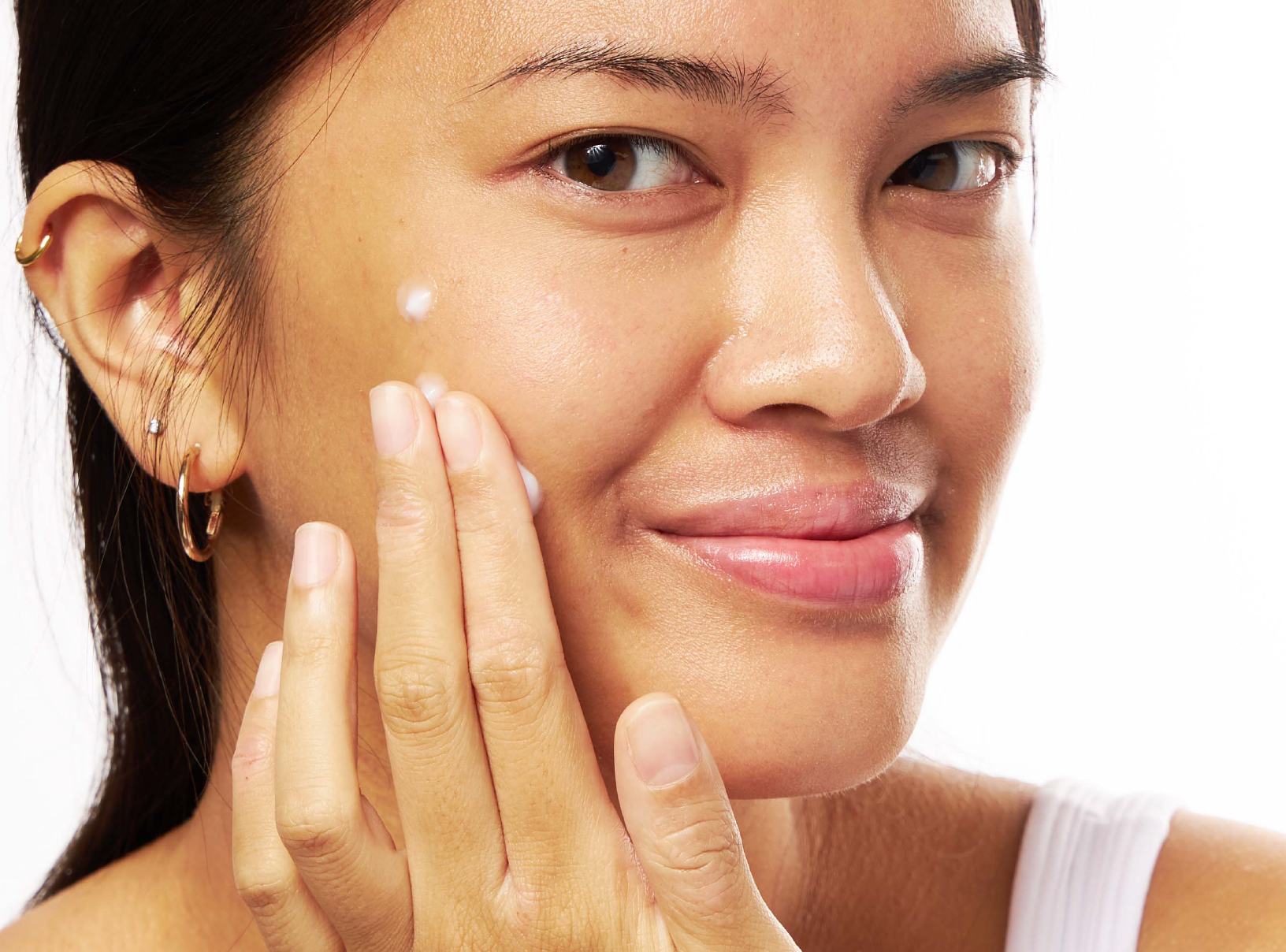Education
Vitamin E Oil for Skin Health


SHARE
Education
Vitamin E Oil for Skin Health
Medically reviewed by Vicky Davis, FNP
Written by Apostrophe Team
Last updated 4/5/2024
You’ve likely heard vitamin E oil is good for your skin. Scraped your knee when you were a kid? Your mom may have dabbed vitamin E oil on your skin (once the wound healed), to help prevent scarring.
And of course, you know vitamins do the body good: They help us regulate our processes, protect our bodies from damage, and help our cells replicate and heal faster.
And it turns out, they’re a necessary part of your skin’s health too. Nutrients like vitamin C get a lot of attention (hello antioxidants), and the properties of vitamin E can be just as beneficial, especially when delivered topically.
Vitamin E in its oil form may help with acne control, sun damage, scar healing, and many other needs your skin might have.
Whether you have sensitive skin or oily skin — or even other skin conditions, understanding the benefits that vitamin E oil has to offer begins with understanding what it does, and why.
What Is Vitamin E Oil?
Vitamin E is one of the fat-soluble vitamins that function as an antioxidant and which can benefit your body. Vitamin E itself is a natural antioxidant; it’s a free radical scavenger, meaning it takes care of those free radicals that want to damage your cells by stealing their electrons.
Instead, vitamin E offers up its own electrons to protect your cells.
As an oral-supplement vitamin, E is well established for its benefits, and it’s been in use in various forms for half a century. These forms of vitamin E can be consumed in foods like nuts, spinach, whole grains, olive oil, sunflower oil, and other plant-based derivative sources.
Vitamin E also has beneficial photoprotective properties, meaning it can help protect you against the free radical damage caused by UV radiation and the sun.
As an antioxidant, vitamin E can also do preventative work to fight free radicals that may eventually cause serious conditions such as cardiovascular disease and cancer. And beyond its antioxidant benefits, vitamin E also plays a role in certain metabolic processes and can bring benefits to the table for your immune system function.
As an oil, vitamin E is simply the vitamin in solution in oil and can be used topically. And good news: Vitamin E oil has been shown to offer some important benefits.
For starters, it can help increase your levels of vitamin E by permeating your skin.
While we don’t fully understand your skin’s ability to absorb vitamin E — which is to say, we don’t know exactly how much your body can absorb, and in what time frame — we do know that it can benefit your skin.
Benefits of Vitamin E Oil
Our traditional, childhood understanding of the role of vitamins isn’t a complete picture. Generally, we grow up understanding that vitamins are good and that some of them help to fight colds, for example. When it comes to vitamin E oil for the skin, however, there’s more to understand.
Vitamin E to Get Antioxidant Benefits
As an antioxidant, vitamin E can help with skin diseases like eczema, and it can also address yellowing nails, psoriasis, and certain types of ulcers.
Vitamin E is also effective in healing scars and reducing the appearance of scars, although there’s not much data on vitamin E oil itself in this application.
Vitamin E can treat Subcorneal pustular dermatoses, cutaneous amyloidosis, Hailey-Hailey disease, epidermolysis bullosa, psoriasis, cutaneous ulcers, and scleroderma.
Vitamin E for Acne Treatment
Vitamin E oil can be a great way to fight acne vulgaris — or acne — when used in combination with other vitamins like the vitamin A derivative isotretinoin.
Further research suggests that vitamin E oil may have anti-inflammatory benefits for your skin, which can help build your defense against further internal and external causes of irritated skin.
Vitamin E for Sun Damage
In addition to giving your skin some vitamins, it can also protect your skin from UV light as a sort-of sunscreen.
Vitamin E for Scar Prevention
While current studies are limited there is evidence that vitamin E oil can combat scarring. It was found, however, that vitamin E oil should not be applied to new or recent scars, where in the best case it does nothing, and in the worst cases, it might actually make scars more prominent.
Can Vitamin E Oil Cause Side Effects?
There are some side effects of vitamin E to be worried about in rare cases, but generally speaking, the medical community agrees that regular doses of vitamin E oil do not typically include side effects. Instead, high doses can cause nausea and diarrhea, as well as stomach cramps when ingested.
Side effects could also include fatigue, weakness, blurred vision, and headache, as well as bruising and bleeding in some rare cases.
As a topical application, vitamin E can cause contact dermatitis, erythema multiforme, and Xanthomatous reaction, in very rare cases.
If you see any evidence of the above side effects, consult a healthcare provider immediately and discontinue the use of vitamin E.
Should You Use Vitamin E Oil for Your Skin?
Studies have simply concluded that while the benefits of vitamin E oil for skin health exist, the ideal dosage information and other factors for topical vitamin E haven’t been established — mainly due to a lack of controlled clinical trials providing some agreed-upon parameters.
The complete answer to whether or not you should use vitamin E oil for your skin involves a more personal look at your skin needs.
Your dry skin or acne-prone skin may require different support, and while vitamin E oil is generally good for your skin, it may not be the exact thing your skin actually needs.
Your skin might have acne for reasons related to hormones, for example, and it might show signs of aging due to issues unrelated to vitamin E.
For best results — for your personal skin health — it’s best to consult with a healthcare professional.
Vitamin E Oil and Your Skin
The benefits vitamin E can deliver are certainly well-defined by the medical community. And when it comes to vitamin E oil for your skin, when applied topically, it’s likely you could see some benefits.
As with any skin health issue, though, it’s best to consult with a healthcare provider to determine what’s best for you.
Taking vitamins is generally a good idea, but they're best taken under the supervision and advice of a healthcare professional. A healthcare professional can also tell you if vitamin E oil could help your skin, for example.
Perhaps you have a scar you’d like to minimize or keep moist. Or perhaps you could use vitamin E as an antioxidant ingredient in a skincare serum — to help protect your skin from free-radical damage.
Either way, a healthcare provider is your best first step to improved skin health. And vitamin E oil could be a helpful addition to your skincare routine.
Vitamin E and skin health. Linus Pauling Institute. (2021, January 1). Retrieved November 15, 2021, from https://lpi.oregonstate.edu/mic/health-disease/skin-health/vitamin-E.
Keen, M. A., & Hassan, I. (2016). Vitamin E in dermatology. Indian dermatology online journal, 7(4), 311–315. https://www.ncbi.nlm.nih.gov/pmc/articles/PMC4976416/.
Baumann, L. S., & Spencer, J. (1999). The effects of topical vitamin E on the cosmetic appearance of scars. Dermatologic surgery : official publication for American Society for Dermatologic Surgery et al., 25(4), 311–315. https://pubmed.ncbi.nlm.nih.gov/10417589/.
U.S. Department of Health and Human Services. (n.d.). Office of dietary supplements - vitamin E. NIH Office of Dietary Supplements. Retrieved November 15, 2021, from https://ods.od.nih.gov/factsheets/VitaminE-HealthProfessional/.
Like what you just read? Sign up for our email list to get the scoop on skincare science delivered straight to your inbox.

Deep Dives
A dermatologist shares his thoughts on the recent studies about benzoyl peroxide and benzene.
Read More
Education
What is milia?
What is milia? Today, we’re jumping into one type of bump that you may have heard about most commonly in infants — milia.
Read More
Education
Best moisturizer for acne-prone skin
If you have combination acne-prone skin, figuring out which moisturizer is best for your skin might be tough. In this guide, we break down the best moisturizer for combination, acne-prone skin.
Read More
